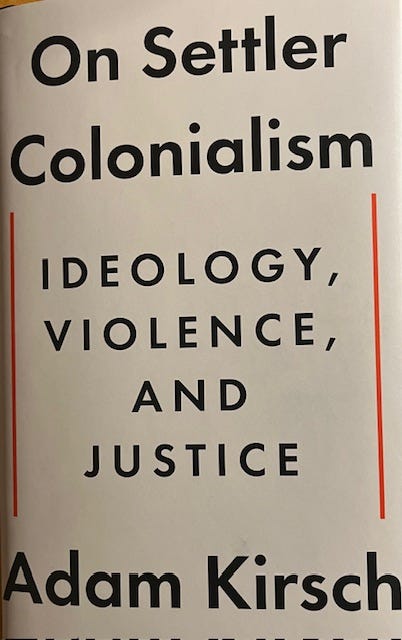3 Books I Highly Recommend
From Torah study to WWII true adventure to defending Israel -- inspiring and informative reads.
The power of chavruta: how study partners learn with and from each other.
It Takes Two To Torah
By Abigail Pogrebin and Rabbi Dov Linzer
Fig Tree Books, 311 pages
“An Orthodox rabbi and Reform journalist discuss and debate their way through the Five Books of Moses,” declares the subtitle of this lively and thoughtful discourse on each of the weekly Torah readings.
Pogrebin is a journalist, author and former president of Central Synagogue, a major Reform synagogue. Linzer is president and Rosh HaYeshiva (rabbinic head) of Yeshivat Chovevei Torah, which “promotes a more open and inclusive Orthodoxy,” according to his bio.
The Torah portion entries are brief, averaging about four pages. They each focus on one intriguing verse or passage, and are presented in dialogue form. The uniqueness and charm of the format – conversations that reflect the give and take of two chavrutas (study partners) – is that it brings to life the very different outlooks of a liberal journalist and a traditional scholar, jousting at times but always displaying deep respect, one for the other. How refreshing.
Not unexpectedly, Pogrebin and Linzer disagree often, including, as they note in the book’s introduction, “whether Reuben – Joseph’s brother – is courageous or a coward, whether welcoming the stranger means welcoming the non-Jew or solely the convert, and whether Moses was unjustly barred” from entering the Promised Land.
Another example: In discussing the symbolism of the ner tamid (eternal light) in the Torah portion “Tzav,” Pogrebin and Linzer clash on whether Jewish survival is, or should be – by itself – a core binder of Jewish identity. She says the fact that Jews have survived for centuries, despite the odds, is “not only miraculous” but should “be celebrated and protected” as a commitment to continuity. Linzer disagrees, asserting that what gives Judaism meaning is “not just the sense of endurance” but rather “learning Torah, doing mitzvot and living an ethical, moral life.” To him, the key question is why it's important that the Jewish people exist.
In the end, the two agree the ner tamid symbolizes an eternal people with an eternal relationship with God.
This book is the collected and edited outcome of a podcast Pogrebin and Linzer did for Tablet magazine – 10 minutes per parsha – that aired from 2018 to 2020. As they note in the book’s introduction, the two met 15 years ago at The Conversation, an annual Jewish Week-sponsored retreat (from 2005 through 2019) that sought to bring together a wide range of Jewish thought leaders and/or activists who might never meet otherwise. The goal was to spark ongoing dialogue and relationships among the more than 850 people who attended over the years.
“We’ve been talking ever since,” Pogrebin and Linzer noted – a prime example of what The Conversation was all about. (For a column I wrote in 2013 on one of the most memorable Conversations, click HERE)
Reflecting on how studying together impacted her reading of Torah, Pogrebrin told me: "Until I studied with Dov, I had never grasped that for an observant Jew, these verses need to be reconciled as all good at the end of the day. That doesn't mean that Dov cannot be critical of a character's actions, but when it comes to any Divine act in the Torah, no matter how harsh, he has to make sense of it as positive. That's a muscle I haven't developed but it challenges me to work harder sometimes to see a hidden blessing or teaching in a difficult chapter."
As for Pogrebin’s influence on Linzer, he replied: “Previously, when I would learn the parsha with an eye towards meaning, the question I would ask is ‘how is this relevant to me as an Orthodox Jew?’ Learning with Abby made me ask myself how the text is relevant to all of us, including people whose lives and beliefs look very different from my own. And it also made me ask ‘how does this speak to the world around us today?’ The Torah was now not just in conversation with me, but also in conversation with the world.”
I was inspired to discover how Pogrebin and Linzer widened their own – and each other’s – horizons. Hopefully, their book, highlighting the power of study partners to parse meanings and share perspectives together will encourage many others to join the eternal conversation.
Shining a ray of light on a dark and tragic time.
‘Two Wheels to Freedom’: The Story of a Young Jew, War Resistance, and a Daring Escape
By Arthur Magida
Pegasus Books, 244 pages (and 26 pages of Notes)
If this was a novel about a young Jewish art student in Berlin during World War II who survived a Nazi manhunt thanks to his outgoing nature, good looks, charm and clever resourcefulness, you’d never believe it.
But this is the true story of Cioma Schonhaus, who after his parents were deported and murdered, decided to hide in plain sight, dressing like a member of the Hitler youth, dining in first-rate restaurants, romancing young women and, at age 20, ultimately bicycling hundreds of miles from Berlin to the Swiss border – the only person to cycle his way through Nazi Germany to freedom.
While in Berlin, young Schonhaus used his artistic talents to become an excellent forger of passports and identity cards, risking his life in saving hundreds of others.
In offering a rare Holocaust-era story that focuses on the hero’s exuberance and optimism, author Magida (a friend and former colleague from our days at the Baltimore Jewish Times) does a superb job of capturing Schonhaus’s “wily ways, zest for life and his appetite for improbable adventures – all of them delighting in the magic that’s beyond the ordinary and the staid.”
Magida is the author of another remarkable book about a little-known hero of World War II, a young Sufi woman, Noor Ianyat Khan, who risked — and ultimately gave — her life to spy on the Nazis in Paris. (The review I wrote of the book, “Code Name Madeleine” in 2021 can be found HERE.)
Like that book, “Two Wheels To Freedom” is artfully crafted and deeply resourced. And in spite of, or because of, all Schonhaus endured – it is truly inspiring.
How an ideology promoting truth and justice is based on lies.
On Settler Colonialism: Ideology, Violence and Justice
By Adam Kirsch
W.W. Norton and Co., 132 pages
A compact book that carries a powerful punch, “On Settler Colonialism” examines the origins of a phrase that is much-discussed but little-understood these days, particularly in connection to the current war between Israel and Hamas. The result has been a misapplication of an ideology that has dangerous consequences, “leading people who think of themselves as idealists into morally disastrous territory,” Adam Kirsh writes in his introduction.
A soft-spoken public intellectual, Kirsch is a highly respected author and scholar of Jewish literature and ideas who has written more than a dozen books. With a clear-eyed approach, he set out soon after October 7, 2023 to explain how so many younger Americans, particularly college students, could respond to the horrific slaughter of 1,200 Israeli citizens by supporting the Hamas perpetrators. One key component in rationalizing such immoral behavior is that defenders of Hamas borrowed a radical ideological theory about the U.S., Canada and Australia – countries that were founded by European settlers on land taken from indigenous people – and applied it to Israel, insisting that its settlers are permanently illegitimate.
In examining this distorted account of history, Kirsh shows how it is misapplied to the Jewish state. He notes that the Israelis killed on October 7 were not “settlers”; they lived inside Israel’s borders. But to those who believe Israel is an illegitimate settler colonial state, all Israeli Jews are illegitimate settlers. “Settler colonialism” has come to mean that “the original injustice” of a group that dispossesses an indigenous group “is being renewed at every moment through various forms of oppression, some obvious, others invisible,” Kirsch explains. In this case Israelis will always be seen as illegitimate settlers. What’s more, he notes, the field of colonial studies has become a major academic discipline in the U.S., not just to be studied but to be combatted as it connects to “capitalism, imperialism, racism and nationalism.”
“The only way for a society to purge that sin is to decolonize,” and while that seems highly impractical in the U.S., for example, hundreds of years after the original sin of the British colonies settling in America, it is being applied to Israel, where every Jewish citizen “is a fair target because none of them has a right to be there.” And so the actions of Hamas on October 7 were widely seen as a form of virtuous violence.
The book points out that not only are Jews indigenous to the land of Israel, as proven by the Bible and historians, but that most early Zionists in the modern era sought refuge in Palestine because they were subject to anti-Semitism from other countries and had no place to go back to.
An important and timely read, Kirsch’s study makes a strong case in showing how “the ideology of settler colonialism is already leading idealistic, educated young people” down a path that can lead to “disastrous results.”
Coming soon: A ‘Between The Lines’ column on 2024’s most intriguing book – on the American Jewish past and future.
—---







Of these three, I've read only the third--concur with your assessment. And will be looking forward to the big reveal to come!